The Best Portable Water Filtration Unit
I wrote an article about the PortaWell™ Portable Water Filtration Unit a few months ago. Several of my readers wanted to know the ins and outs of the unit. Well, the company sent me an email and asked me if I would write a review, and as part of that, we decided to show my readers how to use it, along with the advantages of this system vs others on the market.
Typically I don’t write about anything I haven’t tried before, but for some reason, Mark and I kept going back to an article he had seen that highlighted this system. So, here I am writing another article about this fabulous unit.
Please keep in mind these are my opinions and thoughts to show you how to use the system in exchange for a PortaWell™ from the manufacturer. After receiving mine and trying it out, I highly recommend this for every home or business.
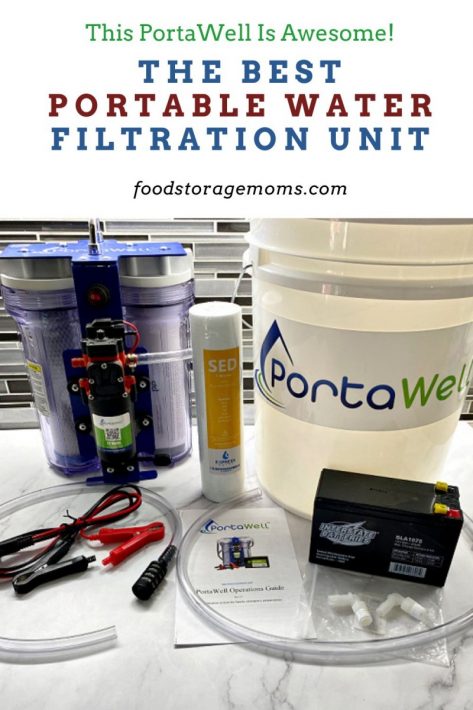
In case you missed this post, Water Filtration System
The Best Portable Water Filtration Unit
You can see in the picture below the various components that come with the PortaWell™ when shipped to you. We’ll review each item and discuss why and how they are used to filter your water effectively.
Note that the filtration system is so compact it came shipped in the white bucket you see. Of course, if you ordered other accessories like the solar charging panels, they would come packed separately.
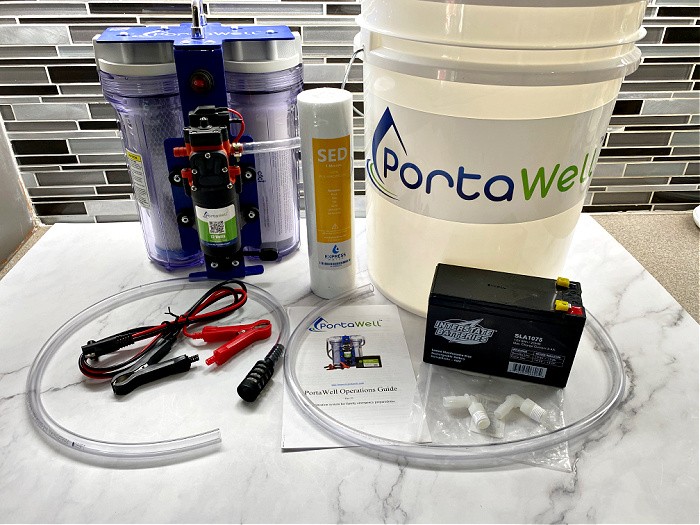
I found the system to be easy to understand and put together. Their website uses the term “intuitive,” and I agree that this unit can be put to use with a common-sense approach. With that being said, I wanted to provide a step-by-step review of the components included, how they are used, and in some cases, the specifications.
The picture below shows the two quick connectors used to connect the inlet and outlet tubes to the filter housings that hold the filters. These connectors actually came with some plumbing tape pre-wound on the threads so there would be a proper seal.
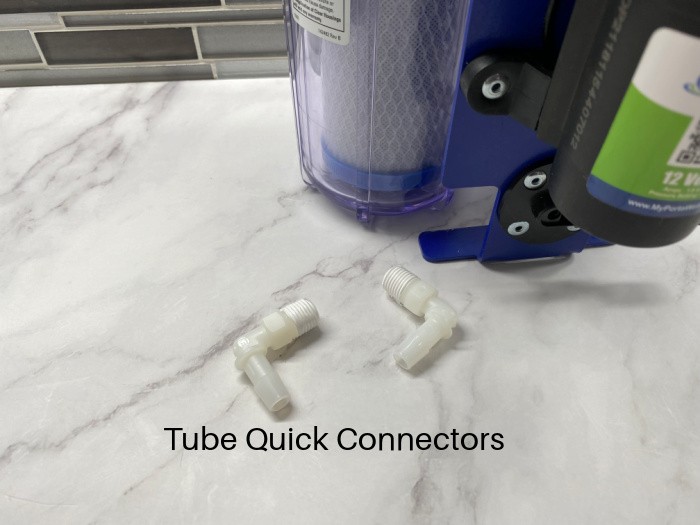
There are two (2) quick connectors included with the supplied items shipped to you. They are used to connect the tube bringing the unfiltered water to the right side of the unit, and the tube to catch and run the clear filtered water out of the left side and into the container you have ready as outlined in the next few pictures and text.
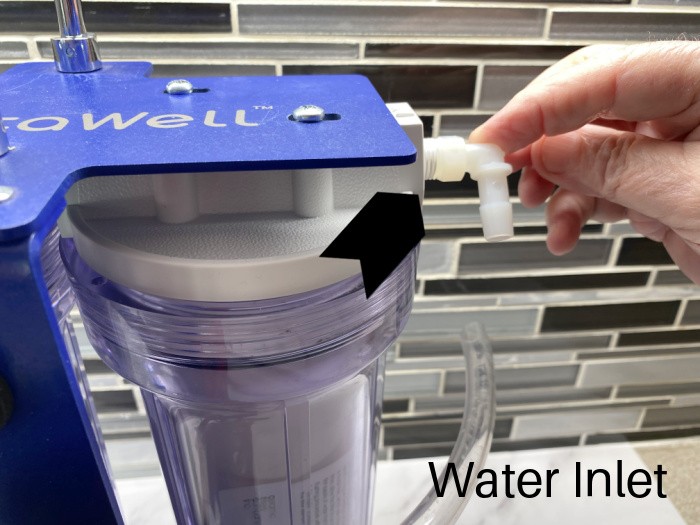
One of the quick connectors is screwed into the right side of the unit where you see the label “in.” Be sure to have the open end of the connector facing down so the tube from the pump can be easily connected.
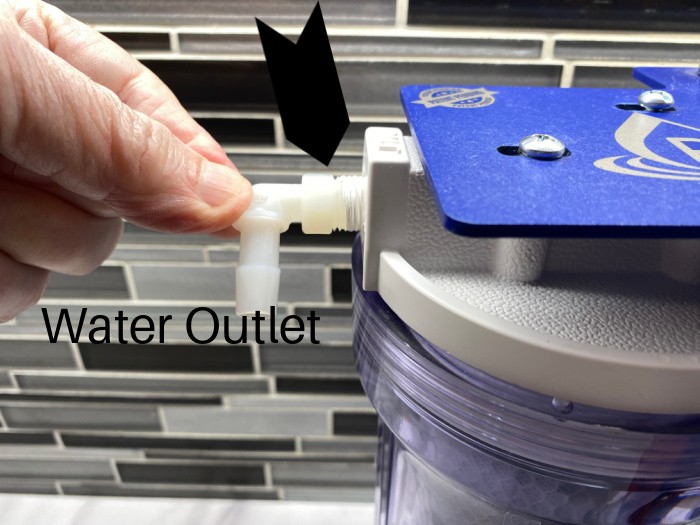
The other quick connector is screwed into the left side of the unit that’s labeled “out.” The connector opening can be facing almost any direction which provides for ease of connecting the outlet tube and placing that tube in the receptacle you are using to receive/store the filtered water.
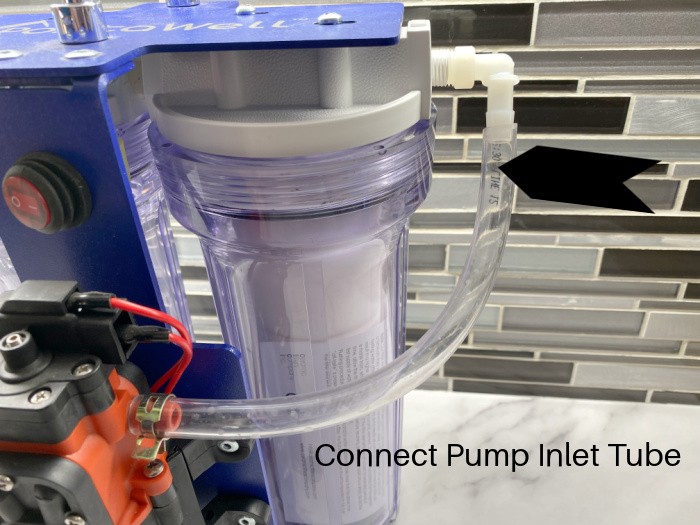
On the top right side of the pump is a pre-installed tube that runs from the pump to the inlet quick connector. As mentioned above, that connector should be facing down for ease of connection. Note that the tube has been attached to the pump using a provided clamp.
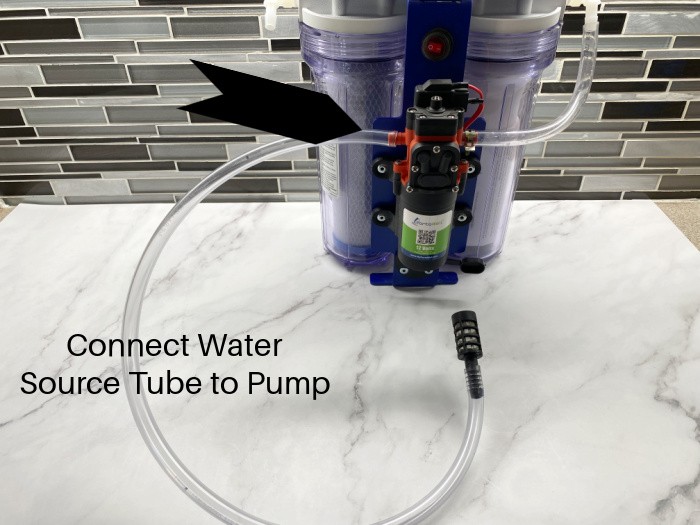
One of the clear tubes provided has a black screen/filter attached to one end. That black attachment is designed to keep any oversized items in the source water from entering the tube and the pump and possibly clogging things so water can’t flow properly. The other end is attached to the left side of the pump.
So, as designed, the water to be filtered enters the left side of the pump and exits on the right side. It then runs through the inlet/right side of the filter section and exits out the left side after being processed through both filters.
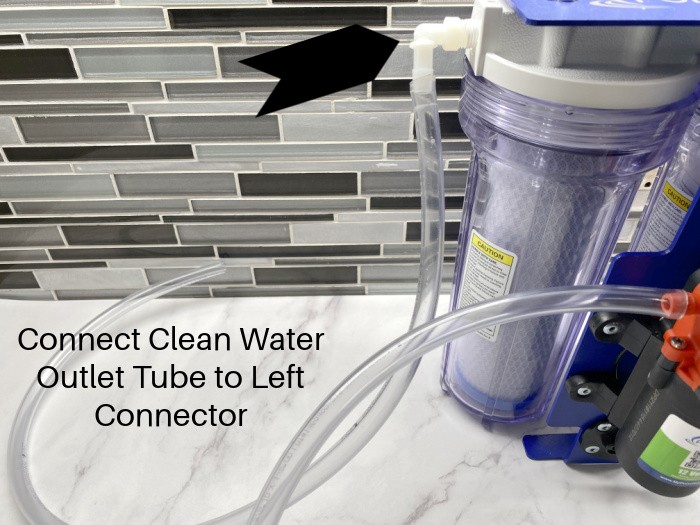
The arrow in the picture above shows where the second clear tube is attached to the unit. As the filtered water exits the system, the clear tube carries the filtered water to the container you have ready to accept the clean water. It should be a large enough container to hold a fair amount of water since the pump pushes up to 60 gallons per hour through the system.
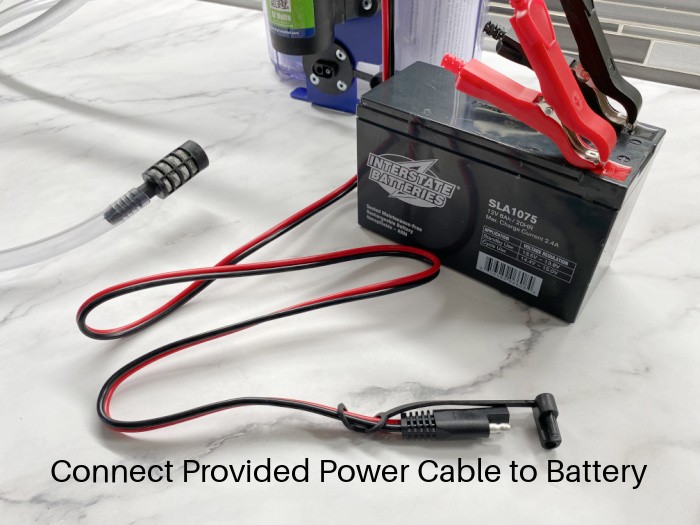
The 12-volt Interstate Battery shown comes fully charged, and ready to go. You can see how the power cable is attached to the battery, putting the red clamp on the red terminal and the black clamp on the black terminal. The other end is plugged into the pump right under the pump assembly as shown in the picture below.
There really isn’t a way to connect that end in error due to the shape and size of the plug and the receptacle. Make sure you seat the plug securely so there is a good connection and the electricity flows smoothly. It’s suggested that the pump be turned off and the cable plugged in BEFORE you connect the cable to the battery terminals.
The battery will run for approximately one (1) hour before it needs to be recharged. If you plan to charge a high volume of water you need to keep in mind that it takes some time to recharge the battery.
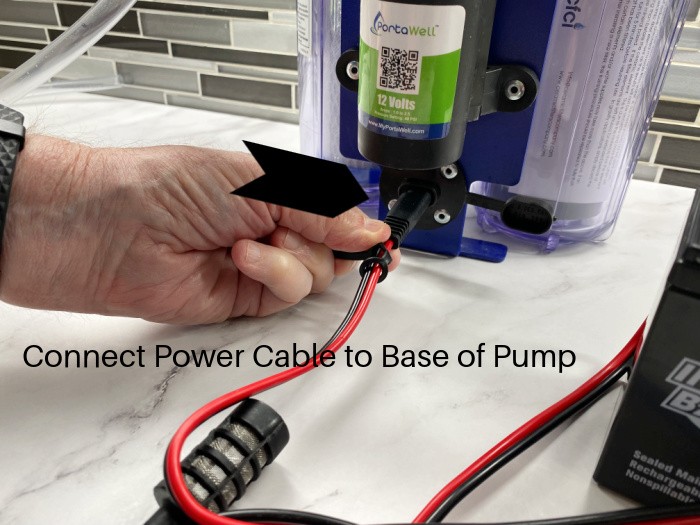
We wanted to have a way to recharge the battery without having to use the solar panels that are suggested. The folks at PortaWell recommended an EverStart MAXX 3 Amp 6v/12V battery charger (part BC3E) as shown below. We found one at Wal-Mart for $19.87 plus tax. The battery did come fully charged, but now we’re ready to recharge the battery going forward.
We feel we have a significant supply of consumable water stored, so we’re ready for emergency situations if they come. We don’t do much camping and hiking these days, so we picture using the PortaWell a little closer to home.
We can see how great this water filtering system would be for those who like to get out in their motorhome, camper, or tent. Please remember the keyword here, it’s portable as in PortaWell™. You can grab and go with this unit, I love this!
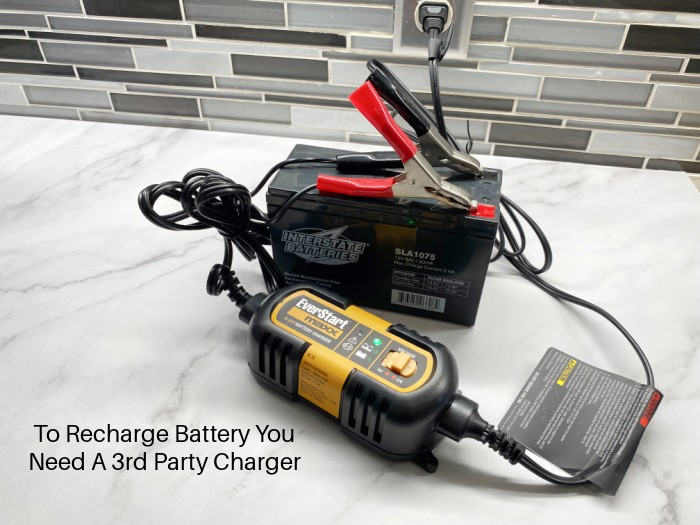
We do see this unit being very helpful in emergency circumstances when you want to have a high-capacity filtering system to assist your extended family and close neighbors who may need consumable water. Think about how many families you can help based on the 60 gallons per hour capacity of the PortaWell™!
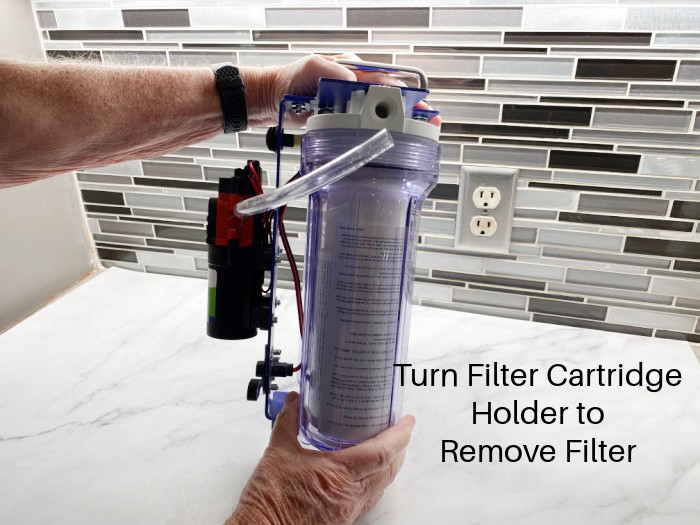
When you receive your PortaWell™ unit you’ll see various instruction and specification sheets inside the filter housing as shown above. Those should be removed and saved with your other operating materials. That is particularly the case with the ceramic filter unit information.
The filter housings come off easily. Note the seals at the top of the filter shown. Each filter has its own type of seal to make sure there isn’t any leakage from the filter unit. The water goes into the middle of the filter and then exits to the outside as part of the filtering process. The pump, although small, does put out good pressure, so the seals need to be in place whenever the system is operating.
Also note, the housings themselves have an “O” ring at the top of the threads so that water doesn’t leak out of the housing as pressure from the pump is applied.
The other filters come with a plastic protective covering that you’ll need to remove before you install them in the housing for use.
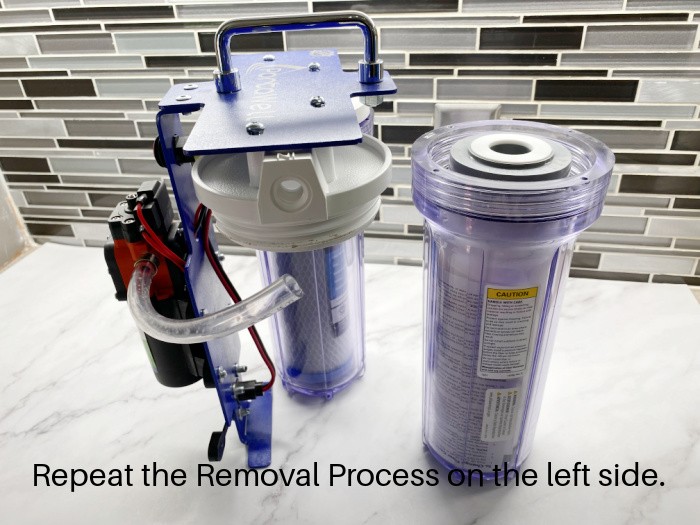
You can see the information materials through the housing unit in the second filter on the left. That housing should be removed from the PortaWell and the filter taken out so the plastic filter cover can be taken off from the filter.
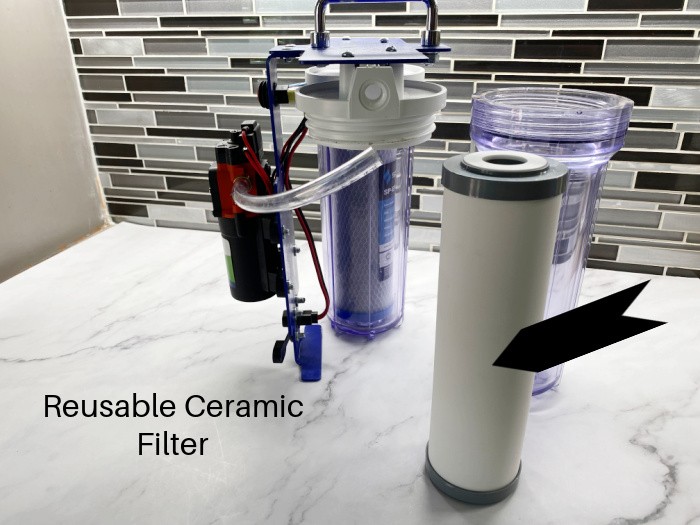
The PortaWell™ water filtration system comes with three (3) different filters. Highlighted above is the reusable ceramic filter. Reusable means that it is designed to be washed after it’s been used a few times, and then put back into service for use again. When delivered, this was the first of the two filters the water would have flowed through as part of the two-phase process. We’ll discuss the three types of filters as shown in the next picture below.
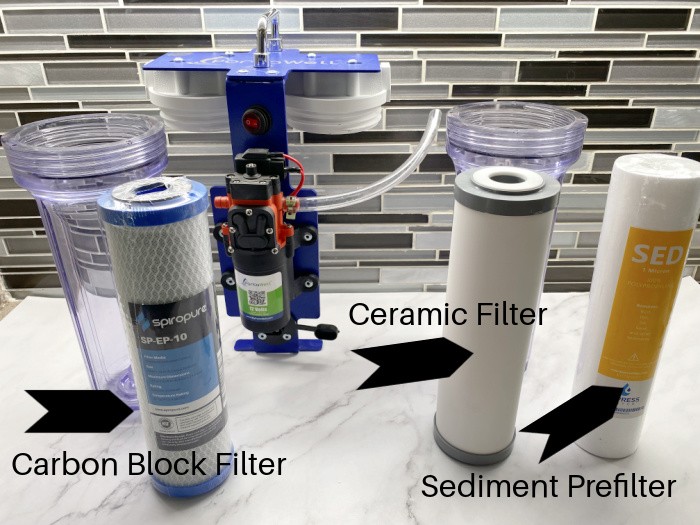
Since this product is a water FILTRATION system, the key components, along with the pump, are the filters. They can make or break how successful your water availability efforts are.
When determining which of the three filters provided should be paired together in any given situation, you need to understand how they are designed to work.
The filter with the yellow plastic cover on your right above is one manufactured by Express Water (www.expresswater.com). In a situation where the water source is one where you’re concerned with the overall condition of the water when it comes to sediment like rust, dirt, silt, sand, and other debris, the SED 1 micron 100% polypropylene is the solution. You would want to put this filter on the right side of the PortaWell as your first line of defense. These filters are not designed to be washed, so it is suggested that you try to make the source water as clear as possible before running it through the system. A good first step is to fill a bucket from the source rather than placing the input tube directly into the cloudy water.
Since the ceramic filter and the carbon filter are designed to filter out different contaminants, it may not be critical in which order they are placed. If the water is fairly cloudy/dirty, you’ll likely have to run the water through the system twice before it gets clear and useable. It MAY be prudent to put the ceramic filter in the left filter housing if using the sediment filter since you can clean the ceramic filters 30 times before they need to be replaced. Note that the carbon filter, like the sediment filter, isn’t washable.
The .5 micron ceramic filter provided with the unit is manufactured by Ceramic Filters Company, Inc. (CFCI) – (www.ceramicfilterscompany.com). These filters are designed to remove bacteria and cysts. Some examples of bacteria you may find in your local pond or stream are E.coli, cholera, salmonella, typhus, and cyanobacteria. You also may find viruses like norovirus and rotavirus.
This ceramic filter is rated under normal usage to filter 10,000 gallons of water before having to be replaced. As mentioned before, you can clean the ceramic filter 30 times. You clean it by brushing the outer surface with a clean plastic brush or soft scouring pad under running water. Remember, don’t ever use any soaps, detergents, or steel wool when cleaning this filter.
The third type of filter provided when delivered is a 5 micron (nominal) powdered activated carbon filter as shown in the picture above with a blue plastic cover. This filter is manufactured by Spiropure (www.spiropure.com). Their website indicates that their filters are composed of NSF-certified coconut shell PAC (powder-activated carbon). They state their filters offer a high dirt holding capacity, along with a high porosity that allows for proper pressure to be maintained during the filtering process.
PortaWell™ states that these filters are rated under normal usage for 1,000 gallons total capacity.
This carbon filter is designed to remove volatile organic chemicals, pesticides, herbicides, and chlorine. In combination with the ceramic filter, most of the common contaminants we are concerned about should be removed through the filtering process. Of course, no water filtration system filters out all harmful contaminants, so you may need to pretreat the source water with chlorine to kill some contaminants, and then let the carbon remove the excess chlorine.
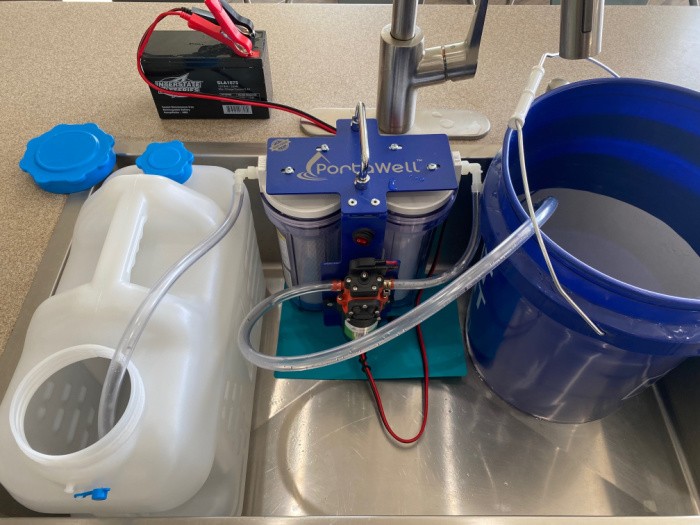
The picture above shows the complete system set up in our sink ready to start. The water source is the blue bucket on the right with the screened tube in the water and the other end attached to the left side of the pump. The outlet tube is attached to the second filter outlet on the upper left and its other end is placed in the receptacle container on the left.
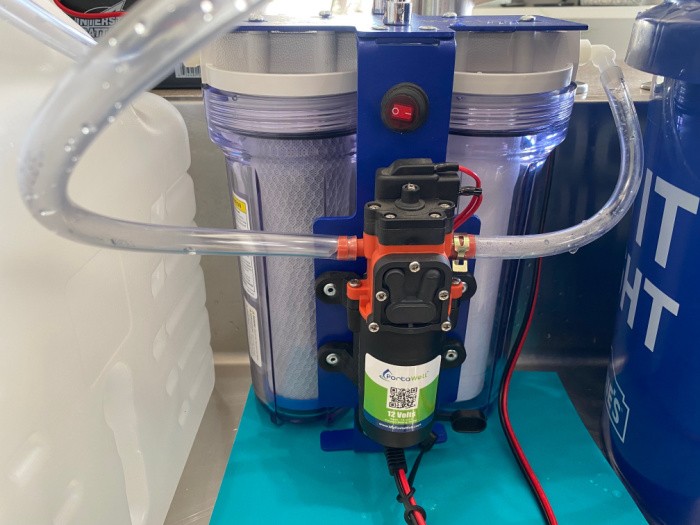
The picture above has a close-up of the pump, tubes, power source cable, and the on/off switch located right above the pump on the system frame.
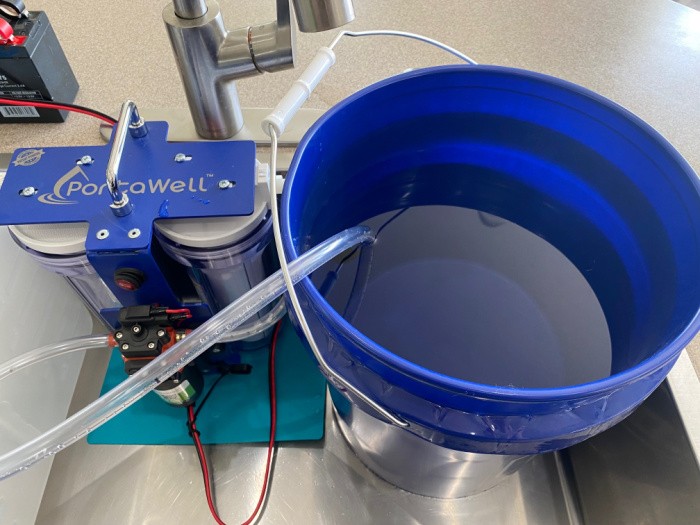
The picture above shows the screened inlet tube in the source bucket. As mentioned before, if the source water has a lot of sediment, particularly particulates floating on the surface of the water, it’s suggested that you try to draw the water from below the surface area sufficiently enough to minimize the risk of collecting water that could plug up the system, particularly the filters. Algae is a real problem for water filtration systems and tends to stick to and plug up the components.

The type of container you use to collect the filtered water should have a rating for safety. Some plastics aren’t rated for food or water storage. Again, do your homework and find a container you can carry as needed, is large enough to accommodate the flow generated from the pump and filters, and is rated for safe water storage.
What are some accessories available through the manufacturer?
There are a number of accessory items that complement the system, either as add-ons or replacements, as follows:
Solar Panel and Charge Controller: the manufacturer suggests you strongly consider purchasing the solar panels so you aren’t limited to location when it comes time to recharge the battery. As mentioned, the battery will run for about one hour on a charge. The 30-to-50 watt 12-volt solar panel will completely recharge the battery in about two hours if the battery is discharged less than 50%. You need the controller to monitor the wattage and to let you know when the battery is charged and ready to go. The cost for the panel and controller is $169.95.
Power Adapter: if you have a standard power outlet available, this adapter can be used to run the pump in lieu of the battery. It could increase the volume of water that can be processed in any given timeframe since you don’t have to worry about recharging the battery every hour or so. It comes with a cable adapter so you can plug the unit right into the PortaWell. It is a great accessory that has a number of built-in safety features. The cost is $19.95.
12-Volt Car Adapter: whether you are out camping and run out of power, or need the power to run the system at home and you’re experiencing a power outage, this car adapter is a handy item to have. It comes with the proper power cable, so you can plug it right into the system. The cost for this adapter is $14.95.
Spare Replacement Pump: designed and built for the PortaWell, this replacement pump is something you should consider having as a backup unit. Although the supplied pump is rated for extended use, having a replacement always provides confidence to those who want to be best prepared. The cost is $28.95.
Maintenance Kit: for those who are handy, this kit includes various parts that tend to wear out, like “o” rings. Visit the PortaWell website to see what is included for the cost of $12.95.
Expansion Kit: if you’d like to increase the filtering capacity or to save on running the source water through the system more than once, you can order this expansion kit that provides an additional two filter housings, so you would be expanding the filtering system from a two-phase to a four-phase unit. Of course, by doing so, you add to the weight and increase the space requirements for storage and use. The price of $79.95 makes for a very cost-effective way to increase the efficiency of this awesome filtering system.
Chlorine Kit: this kit gives you the chlorine necessary for that extra level of protection when you’re concerned about what might be present in the water you are trying to filter. Its contents can also be used to clean surfaces and sanitize your cooking utensils. This kit is priced at $11.99.
Filters: the manufacturer has available all the filters outlined in this review post. They come in single, combined, and multiple filter sets based on your needs. Based on the variety of choices, you’ll find a variety of price points to meet your financial needs too. Check out their website for the details.
Is there good documentation to support the operation and care of the system?
Due to the great engineering, design, and components incorporated in the PortaWell, the Operations Guide is fairly short. It does include the critical information necessary to make the best use of the unit. Their website is also well designed and user-friendly. You can negotiate the various links to gather information and answer the most common questions that might come up.
The operations guide does have a section that outlines a few precautions the manufacturer wants to make sure you as the owner are aware of and follow. I’ve listed those below so you are well informed before a purchase is made:
Precautions:
Use good judgment when selecting a water source to be filtered and always seek the best freshwater source available. Avoid water sources that are obviously contaminated with chemicals, heavy sediment, algae bloom, and/or biological waste (animal or human) products. If viral contamination of the water is suspected, pretreat the water with a chlorine solution and let sit for 30 minutes before pumping through the unit.
The pump is not designed for continuous duty operation. To extend the life of the pump, the best practice is to operate for up to 30 minutes and rest for 5 minutes. If the ambient temperature is above 90 degrees F, reduce the operating time and extend the rest times accordingly. Always shield the pump from direct sunlight when operating to help minimize pump overheating.
Don’t store the unit in below-freezing conditions unless the system has been winterized to remove all water from the filter housings, transfer tubes, and pump.
Don’t store the unit in direct sunlight. This is to prevent deterioration of the filter housing.
Don’t pump anything other than water through the unit.
Don’t power the unit with any source other than 12 volts. The solar panel (if used) should be connected to a battery and the battery to the unit. A 110-volt to 12-volt transformer (optional) may be used to power the unit.
Don’t operate the pump without the screen inlet tube filter. This is to prevent debris from entering the pump.
Don’t store the unit with water in the filter housings for more than 72 hours. This is to prevent any algae buildup.
Please check out these units at My PortaWell™.com
Final Word
We are so excited to recommend this wonderful water filtration system. Since we all need to store water and have the ability to filter our own water when good quality culinary water isn’t available, the PortaWell provides the extra level of comfort that we are as well prepared as possible in case an emergency or disaster comes our way.
The key points that make this product something you should seriously consider purchasing as part of your family preparation plan are high capacity filtration, solar rechargeable power system, true two-stage (or more with the extension accessory) filtration, commercially available replacement filters, a system that is compact and portable, a water filtration system that is very simple to learn and use.
Please give this review your attention. We seldom make strong recommendations for products we discuss on my website or through the posts we generate. The PortaWell is an exception, it is certainly worth your consideration as we all try to stay prepared. May God bless this world. Linda






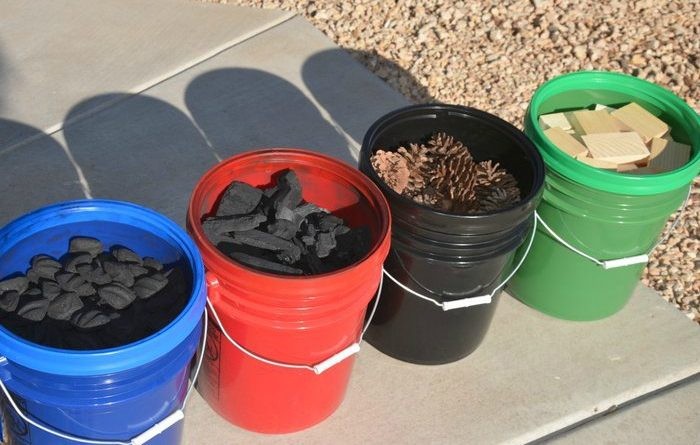
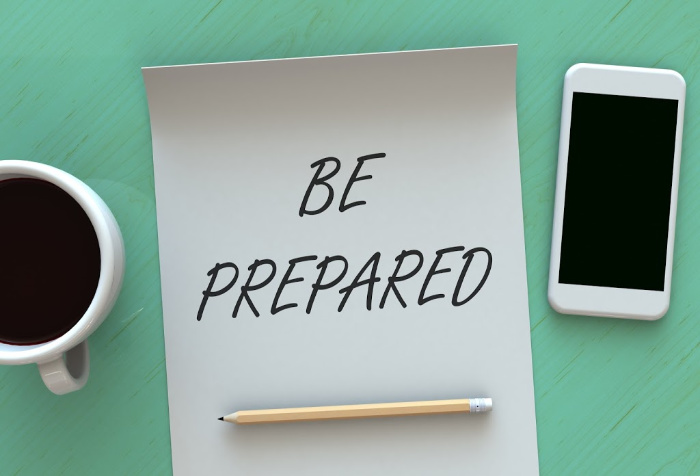














This would be handy if we did not have power. We have a well and it would not be a problem for Jack to take out the pump and make a hand pump for it but even though we have wonderful well water you never know what your water will be like if something happens.
I will look into this. 10 Stars
Hi Jackie, I agree we may need something to filter and purify our water. Linda
Linda, while the PortaWell sounds like a good filtration system none of the pore sizes in any of those filters is small enough to remove bacteria. I’ll stick with my AquaRain, which will filter out bacteria. It’s ceramic filter can be cleaned up to 200 times. And it is easily as portable as the PortaWell. It also features no moving parts so there’s no pump to break down. Just pout 2-3 gallons into the top of the unit and let gravity do the work. It is to date the only device the EPA has certified to both filter and purify water.
It has literally been proven to purify raw sewage into safe drinking water.
Hi Ray, I love hearing this about the AquaRain. It’s perfect for what you’re using it for, that’s for sure. Linda
Linda, I checked out the PortaWell again. It can filter much more water in a give time period than my AquaRain, which takes several hours to filter 3 gallons. So if you have a large group of people, or need a lot of filtered water fast, it’s a good idea. The PortaWell also costs almost as much as my AquaRain, and if you got the solar power option it would cost quite a bit more.
If the water is really murky I’d run it through a bucket of clean sand before running it through your PortaWell.
Normally when I think of portable water filtration devices I think of Survivor Filters or LifeStraws, small hand held devices–the type of thing I’d have killed to have back in my backpacking days.
When we lived on well water, I simply filled up the AquaRain every evening before bed and in the morning had all the water we’d need for drinking or cooking the next day.
Hi Ray, I bet you were so glad to have that AquaRain when you were using well-water!! Love it! Linda
Just a thought, I assume that most preppers have a solar generator and a solar panel to charge it with?!?! If so, then maybe just use that (assuming you already have one) instead of purchasing separately a solar charger with panel and wall charger. Just a thought. This way your preps have multiple uses and are easier to keep up with.
I am definitely, going to their site to look further into this as I just purchased an “as-is” house on 9 acres with a creek and artesian springs. The house has been abandoned so long that it needs another well dug and hooked up to the house. Was thinking something like this would be useful while we are there on weekends working on the property without water!
Hi Ravenna, a lot of people do not have solar generators. Some have gas generators. You are so right, we can figure out how to use it for sure. It’s an awesome unit. Linda